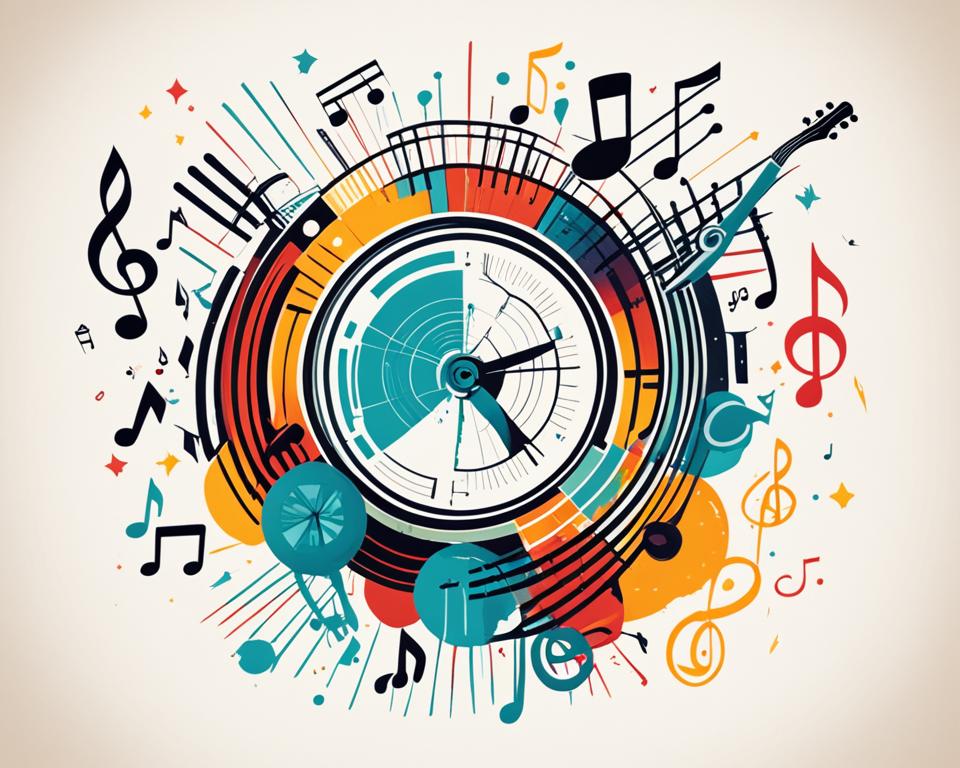Music has a remarkable ability to touch our souls, evoke powerful emotions, and transport us to different times and places. Whether we find solace in soothing melodies or get lost in the electrifying beats of our favorite genres, music has a profound psychological impact on our minds. In this article, we will delve into the enchanting world of music genres and artists, exploring their influence on our thoughts, emotions, and overall well-being.
As we embark on this journey, we will unravel the universal language of music that transcends boundaries, connecting people from diverse cultures and backgrounds. We will dive into the psychological underpinnings of how music is processed by the brain, uncovering its emotional chameleon-like nature. From joy to sadness, music takes us on a rollercoaster ride of emotions, leaving an indelible mark on our hearts and minds.
Prepare to explore the emotional sway of various music genres, from the infectious rhythms of pop to the rebellious spirit of rock. We will examine how music genres and artists act as emotional architects, crafting compositions that harness the power to shape our emotions and leave a profound impact on our lives. Furthermore, we will delve into the science behind music’s ability to regulate our mood, stimulate pleasure in our brains, and curate playlists that enhance emotional well-being.
But music’s influence doesn’t stop there. We will discover music therapy, a harmonious healer that uses musical elements to promote emotional well-being and help overcome challenges. We will also explore the different functions of music listening, from its role as a coping mechanism to its ability to foster self-expression and forge social connections.
From the historical roots of music to its modern applications, we will unravel the fascinating journey of this art form. Music’s impact on the psychological development of adolescents will be examined, shedding light on how it shapes their identities. We will also unravel the influence of musical diversity on our psyche and the cross-cultural effects that bind us together.
So, get ready to embark on a melodic adventure as we uncover the secrets of music’s psychological impact on the mind. Let the rhythm guide you through the pages, as we explore the extraordinary power of music to heal, inspire, and transform.
Key Takeaways:
- Music has a profound psychological impact on our emotions, thoughts, and overall well-being.
- Music is a universal language that transcends boundaries, connecting people from diverse cultures.
- Different music genres and artists evoke specific emotional responses and shape our moods and psychological states.
- Music activates neurological pathways associated with pleasure and regulates our emotions.
- Music therapy harnesses the healing power of music to promote emotional well-being and overcome challenges.
Introducing the Universal Language of Music
Music has long been celebrated as a universal language that transcends boundaries. It has the remarkable ability to communicate directly with the soul, evoking emotions, and bringing people together, regardless of linguistic or cultural differences. The universal language of music unites us in a collective experience that goes beyond words and fosters a deep sense of connection.
The Power of Music in Transcending Boundaries
Music has the power to break down barriers and bridge gaps between individuals and communities. It serves as a means of communication that surpasses language, allowing us to connect on an emotional level. Whether it’s through a rousing anthem that unites a crowd or a soulful ballad that touches hearts across the globe, music has the ability to bring people together in a way that is truly unique.
How Music is Processed: The Psychological Underpinnings
The psychological processing of music is a complex phenomenon that involves various regions of the brain. When we listen to music, our brains engage in intricate cognitive processes, analyzing the rhythm, melody, and emotional content of the music. This processing occurs in regions such as the auditory cortex, amygdala, and prefrontal cortex, influencing our emotional and cognitive responses to the music we hear.
From Joy to Sadness: The Emotional Chameleon of Music
Music has the incredible ability to evoke a wide range of emotions within us. It can uplift our spirits, bringing us joy and happiness, or transport us to a place of introspection and melancholy. The emotional impact of music is deeply personal, as each individual may have a unique response to different genres, artists, or even specific songs. This emotional chameleon-like quality of music is what makes it such a powerful medium for self-expression and emotional connection.
In the next section, we will explore the different emotional responses that different music genres elicit and delve deeper into the profound impact of music on our psychological well-being.
The Emotional Sway of Music Genres
Different music genres have distinct emotional characteristics that can evoke specific emotional responses in listeners. The emotional impact of music genres plays a significant role in shaping our mood and psychological state. For example, pop music often elicits feelings of happiness and excitement, while rock music can evoke energy and empowerment. Let’s explore the genre-specific emotions and the influence they have on our emotional well-being.
Music Genres and Artists as Emotional Architects
Music has the incredible power to shape and manipulate our emotions, and the artists who create it act as emotional architects, constructing compositions that elicit specific emotional responses in listeners. From the heartfelt ballads that bring tears to our eyes to the energetic dance tracks that make us want to move our bodies, music artists have the ability to evoke a wide range of emotions through their creations.
Through the combination of melodies, harmonies, rhythms, and lyrics, music genres and artists craft sonic experiences that have a profound impact on our emotional well-being. They are skilled at tapping into the core of human emotions and have a deep understanding of how different musical elements can elicit specific emotional states.

“Music expresses that which cannot be put into words and that which cannot remain silent.” – Victor Hugo
Music genres often have characteristic emotional qualities. For example, a melancholic melody in a minor key is commonly associated with sadness, while an upbeat tempo and major key are often linked to happiness. Artists within different genres also bring their unique emotional perspectives and interpretations, infusing their compositions with their own experiences and feelings.
As listeners, we connect with music on both conscious and subconscious levels. We may find solace in a melancholic song that captures the essence of our emotions, or we may feel a surge of empowerment and motivation while listening to an energetic anthem.
Furthermore, music has the ability to transport us back in time, evoking vivid memories and emotions associated with specific moments in our lives. A certain song can act as a time machine, instantly whisking us away to a particular memory or emotional state.
By exploring the role of music genres and artists as emotional architects, we gain a deeper appreciation for the profound impact that music has on our emotional well-being. It highlights the ability of music to touch our souls, uplift our spirits, and bring us together in shared experiences of joy, sadness, love, and everything in between.
| Music Genres | Emotional Impact |
|---|---|
| Pop | Uplifting, joyful |
| Rock | Energetic, empowering |
| Blues | Soulful, melancholic |
| Classical | Elegant, contemplative |
The Science of Music and Mood Regulation
Music has a profound impact on our mood and overall well-being. It has the power to evoke emotions, inspire us, and even change our state of mind. But what exactly happens in our brains when we listen to music? In this section, we will explore the neurological pathways involved in music-induced pleasure and the ways in which we can use music playlists to regulate our emotions and promote emotional well-being.
Neurological Pathways in Music-Induced Pleasure
When we listen to music, our brains light up with activity. Neurotransmitters like dopamine, which are associated with pleasure and reward, are released, creating a positive emotional response. This activation of neurological pathways leads to a profound sense of pleasure and can have a direct impact on our mood. Understanding these pathways can help us harness the power of music to enhance our emotional well-being.
Curating Playlists for Emotional Well-being
Creating a music playlist tailored to our emotional needs can be a powerful tool for mood regulation and emotional well-being. By selecting music that aligns with our desired emotional state, we can intentionally shift our mood and enhance our overall well-being. Whether we seek relaxation, motivation, or comfort, curating playlists allows us to explore different genres, artists, and lyrics that resonate with our emotions.
Music playlists can be personalized to suit specific needs and situations. For example, a playlist of calming instrumental music can promote relaxation and stress reduction, while an upbeat playlist of energetic songs can increase motivation and productivity. By intentionally selecting music that reflects our desired emotions, we can use playlists as a tool for self-care and emotional regulation.
Music Therapy: The Harmonic Healer
Music therapy is a powerful healing modality that harnesses the restorative powers of musical elements to help individuals overcome challenges and promote emotional well-being. With its profound impact on the mind and emotions, music has been proven effective in treating various conditions, including anxiety, depression, autism spectrum disorder, and post-traumatic stress disorder.
Restorative Powers of Musical Elements
Music possesses an innate ability to touch our deepest emotions and invoke powerful physiological responses. It engages multiple regions of the brain, activating neural pathways associated with pleasure, memory, and emotional regulation. The harmonic qualities, rhythm, and tempo of music all contribute to its therapeutic effects, with certain musical elements resonating more strongly with specific emotional states.
Through carefully curated playlists and compositions, music therapists are able to create a soothing and supportive environment for individuals seeking healing and emotional balance. Whether it’s the calming melodies of classical music or the energizing beats of upbeat tunes, different musical elements can elicit profound emotional states, helping individuals process their emotions and find solace.
Overcoming Challenges with the Help of Music
The healing power of music extends beyond its ability to evoke emotions. Music therapy provides individuals with a safe space for self-expression, allowing them to explore their feelings, confront unresolved trauma, and gain a sense of empowerment. By integrating music into therapy sessions, individuals can find comfort, release stress, and discover new ways of coping with their challenges.
Moreover, music has a unique ability to foster a sense of connection and belonging. Group music therapy sessions encourage social interaction and provide a supportive community where individuals can share their experiences, find common ground, and build meaningful connections. This social aspect of music therapy further enhances its effectiveness in promoting healing and emotional well-being.
By tapping into the healing power of music, individuals can overcome challenges, find solace, and embark on a journey of self-discovery and transformation. The transformative potential of music therapy offers hope and empowerment, allowing individuals to navigate their emotional landscapes and create a harmonious balance within themselves.

Understanding the Functions of Music Listening
Music serves various functions in our lives, creating a profound impact on our psychological well-being. It functions as a coping mechanism for stress, providing solace and relaxation during challenging times. Listening to music can also be a means of self-expression, allowing individuals to connect with their emotions and articulate their inner experiences. Furthermore, music has the ability to foster social connections and create a sense of belonging, as it transcends language and cultural barriers. Additionally, music serves as a source of entertainment, offering pleasure and enjoyment. By understanding the multifaceted functions of music listening, we can harness its power to enhance our psychological well-being and enrich our lives.
A Look at Music’s Historical Roots and Modern Application
Music has a rich history and has played a significant role in human culture throughout the ages. It is not just a form of entertainment but also a reflection of societal values, beliefs, and traditions. Understanding the historical roots of music allows us to appreciate its cultural and evolutionary significance.
Theories on the Origin and Functionality of Music
One of the oldest theories on the origin of music dates back to ancient Greece, where it was believed that music originated from the harmonious sounds of the cosmos. Other theories propose that the origin of music can be traced back to vocal communication and rhythmic movements in early human communities. Regardless of its precise origins, music has served various functions throughout history.
“Music is the universal language of mankind.” – Henry Wadsworth Longfellow

Music’s Role in Leisure and the Formation of Social Bonds
Music has always been an integral part of leisure activities, providing entertainment and enhancing the overall experience. Whether it’s a lively dance at a social gathering or a soothing melody during a moment of relaxation, music adds depth and meaning to our leisure time.
Furthermore, music has the remarkable ability to foster social bonds and bring people together. From ancient tribal rituals to modern-day concerts, music has been a catalyst for communal celebrations, strengthening social connections and creating a sense of belonging.
The Modern Application of Music in Leisure and Social Contexts
Today, music continues to play a crucial role in leisure and social contexts, albeit in new and innovative ways. With the advent of technology, we can carry our favorite tunes with us wherever we go, creating personalized soundtracks for different activities.
Music streaming services and social media platforms have also revolutionized the way we discover and share music, allowing us to connect with others who have similar musical preferences. Whether through curated playlists or virtual concerts, music has become more accessible and interconnected than ever before.
In conclusion, the historical roots of music provide us with valuable insights into its cultural significance, while its modern application in leisure and social contexts showcases its continued relevance and adaptability. Music is not just a form of entertainment but a fundamental aspect of human existence, shaping our emotions, experiences, and social bonds.
The Impact of Music on Adolescents’ Psychological Development
Adolescence is a critical period for psychological development, and music plays a vital role in shaping the identity and emotional well-being of adolescents. Research has shown that music can serve as a means of self-expression and a tool for emotional regulation among adolescents. The exploration and interaction with music during this stage of life contribute to the formation and consolidation of their sense of identity.
During adolescence, individuals undergo significant changes in their cognitive, emotional, and social development. The process of identity formation is central to this stage, as adolescents seek to establish a sense of who they are and where they belong in the world. Music serves as a powerful medium through which adolescents express their thoughts, emotions, and inner experiences, providing them with a platform for self-reflection and exploration.
Through music, adolescents can find a sense of belonging and connection with others who share similar interests and experiences. They often gravitate toward music genres that resonate with their feelings and values, forming social connections and subcultures based on shared musical preferences. This sense of belonging contributes to their psychological well-being, fostering a positive sense of identity and self-esteem.
Research has also shown that music can act as a coping mechanism, helping adolescents navigate the challenges and complexities of adolescence. Adolescents often turn to music during times of stress, sadness, or confusion, finding solace and emotional release in the lyrics, melodies, and rhythms. Music has the power to validate their emotions, provide comfort, and offer a source of support and catharsis.
The influence of music on adolescents’ psychological development extends beyond emotional expression and coping. Music education and engagement have been linked to enhanced cognitive skills, such as improved attention, memory, and critical thinking. The discipline required to learn an instrument or participate in a choir can foster self-discipline, perseverance, and a sense of accomplishment, contributing to overall psychological well-being.
Moreover, music can shape adolescents’ attitudes, beliefs, and values, influencing their worldview and social interactions. The lyrics and themes of music can provide adolescents with perspectives on various social, cultural, and political issues, helping them develop empathy, critical thinking, and a deeper understanding of the world around them.
“Music is a powerful medium through which adolescents express themselves, form social connections, and navigate the challenges of adolescence.”
In conclusion, music plays a critical role in the psychological development of adolescents. Through music, adolescents find a means of self-expression, emotional regulation, and identity formation. It provides a platform for connection, coping, and cognitive growth. By recognizing and supporting the impact of music on adolescents, we can nurture their well-being, foster a positive sense of identity, and promote their overall psychological development.
| Benefits of Music on Adolescents’ Psychological Development |
|---|
| Supports self-expression and emotional regulation |
| Facilitates the formation of a positive sense of identity and belonging |
| Serves as a coping mechanism during times of stress and difficulty |
| Enhances cognitive skills, attention, and critical thinking |
| Shapes attitudes, beliefs, and values |
The Influence of Musical Diversity on the Psyche
Musical diversity has a profound influence on the human psyche, both at individual and cultural levels. The plethora of different musical genres and styles allows for a rich and varied musical experience that can deeply impact our emotions, thoughts, and overall well-being.
One aspect of musical diversity that plays a significant role in shaping our psychological health is cross-cultural music influence. Music from different cultures has the power to provide individuals with a sense of comfort, inspiration, and connection. When we listen to music from cultures different from our own, it broadens our perspective and exposes us to new sounds, rhythms, and melodies. This cross-cultural exposure can evoke a sense of curiosity, fostering a deeper appreciation for other cultures and promoting a more inclusive worldview.
Furthermore, different music genres and their unique characteristics have specific effects on our emotions and psychological well-being. For example, upbeat and energetic genres like pop and dance music can have an uplifting effect, boosting mood and motivating movement and productivity. On the other hand, introspective genres such as classical and ambient music can induce relaxation, reduce stress, and facilitate introspection and meditation.
Cross-cultural music influence and genre-based musical characteristics both contribute to the diverse range of emotional responses that music can elicit.
Cross-Cultural Music Influence on Psychological Health
The impact of cross-cultural music influence on psychological health is profound. As we expose ourselves to music from different cultures, we engage with unfamiliar sounds, languages, and musical traditions. This exposure has the potential to unlock new emotions and broaden our emotional range. Cross-cultural music can evoke feelings of nostalgia, curiosity, excitement, and even sentimentality. It allows us to connect with the experiences, emotions, and stories of people from diverse backgrounds, creating a sense of empathy and fostering emotional connection and understanding.
Moreover, cross-cultural music can be a source of comfort in times of distress or sadness. When facing challenges or difficult emotions, listening to music from other cultures can provide solace and offer a different perspective on our own struggles. Whether it’s the soothing melodies of traditional Indian music or the rhythmic beats of African drumming, cross-cultural music has the power to transport us to different worlds, providing a sense of escape and rejuvenation.
Genre-Based Musical Characteristics and Their Effects
Each music genre possesses its own unique set of characteristics that elicit specific emotional responses. For example:
| Music Genre | Characteristics | Effects on Emotions and Psychological Well-being |
|---|---|---|
| Pop | Catchy hooks, upbeat rhythms, and uplifting lyrics | Boosts mood, promotes happiness and positivity |
| Rock | Powerful guitar riffs, energetic drum beats, and rebellious lyrics | Elicits energy, empowers and motivates |
| Classical | Elegant melodies, intricate compositions, and emotional depth | Induces relaxation, reduces stress, and enhances focus |
| Hip-Hop | Catchy beats, rap verses, and storytelling | Fosters self-expression, empowers, and provides a sense of identity |
By understanding the genre-based musical characteristics, we can curate playlists catered to our emotional needs and preferences. The ability to choose music that aligns with our current emotions allows us to actively engage with our emotional experiences, regulate our mood, and enhance our overall psychological well-being.
Conclusion
In conclusion, music has a profound psychological impact on our emotions, thoughts, and overall well-being. It serves as a universal language that transcends boundaries and elicits specific emotional responses. Whether it’s the uplifting melodies of pop music, the introspective lyrics of folk songs, or the energetic beats of hip-hop, each genre has the power to evoke powerful emotions within us.
By understanding the psychology of music and its influence on our psyche, we can harness its power for emotional well-being and personal growth. Music has the ability to inspire and motivate us, providing a source of comfort during challenging times and a means of self-expression. Through music, we can explore our feelings, find solace, and connect with others who share our musical preferences.
Furthermore, the psychological impact of music extends beyond personal enjoyment. Music has been used in therapeutic settings to treat various psychological conditions, including anxiety, depression, and trauma. It has the potential to heal and restore, offering a unique form of therapy that speaks to the soul.
So, next time you find yourself craving an emotional release or seeking a moment of tranquility, remember the power that music holds. Let the melodies of your favorite songs guide your emotions, uplift your spirit, and enhance your overall well-being. Whether you’re listening to a catchy pop tune, a soulful ballad, or an energizing rock anthem, music has the ability to touch your soul in ways that words alone cannot.
FAQ
How does music influence our emotions?
Are there specific emotions associated with different music genres?
How do music genres and artists impact our emotional well-being?
How does music affect our brain and neurological pathways?
Can music be used in therapy to promote emotional healing?
What functions does music serve in our lives?
What is the historical significance of music?
How does music impact the psychological development of adolescents?
How does musical diversity influence the human psyche?
Source Links
- https://mdlbeast.com/xp-feed/music-industry/the-psychology-of-music-how-melodies-affect-our-mood-and-well-being
- https://www.ncbi.nlm.nih.gov/pmc/articles/PMC3741536/
- https://www.frontiersin.org/journals/neuroscience/articles/10.3389/fnins.2023.1236638/full



